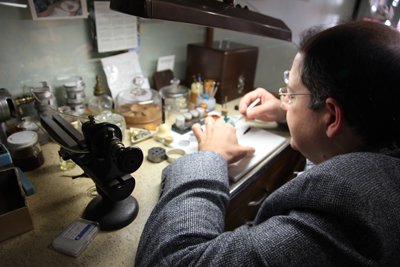It's a mad, mad, lightning-paced, satellite-synchronized world we've created for ourselves. Productivity and multitasking are the highest of virtues, and time – always of the essence, yet always running out – has become our greatest obsession. We live in such constant fear of missed deadlines and ill-spent hours that we surround ourselves with clocks: on the computer, in the car, and everywhere in between.
It's really no wonder, then, that so many of our cultural fantasies involve escaping into an Old-Home-Days kind of past – into an analog America where time wasn't a frantically monitored arch nemesis but a steady and manageable fact of life. For most of us this America was laid to rest about the time telephones started playing music, but for Mark Yusko, otherwise known as the Bristol Watchmaker, this America is alive and well.
To step inside Yusko's shop at 13 Pleasant St. is to step back in time. No music pours out when you open the door. Instead, there is only a gentle, muffled ticking that runs just beneath the rarest of modern sounds: quiet. Wall clocks and mantle clocks and pocket watches are displayed along the walls, their faces bearing inscriptions of now-forgotten companies like Westclox and Keno and National Call. Situated on the front counter, where most proprietors would place a computer, is an old National cash register – the wooden kind, with large colorful buttons.
Not unlike the objects that countenance his store, Yusko is something of a rarity these days. He is a certified master watchmaker – an expert craftsman in an age when most of us struggle to assemble pre-made IKEA furniture.
And Yusko is rare for another reason. He is one of the lucky few who would do his job as a hobby even if there were no money in it.
“I've always loved old things,” says Yusko, who greets me with two watchmaker's loupes (or magnifying lenses) attached to his eyeglass frames. “Fountain pens, typewriters . . .”- and especially clocks.
Yusko says this enthusiasm took root at age 4 or 5, when he discovered the World War I-era watch his grandfather wore when he emigrated from Hungary. By age 10, Yusko had taught himself the inner workings of everything from kitchen timers to cuckoo clocks, and after high school he passed the written and practical exams required to become a master watchmaker.
That was almost 30 years ago, but Yusko's passion for his work is still fresh. Did you ever wonder what a mainspring was, or how clocks became a fixture in American homes? Do you know why your jeans have a small pocket on the right hand side, or how your wrist watch is connected to World War I?
Yusko has the answers. And like any true aficionado, he has his favorites as well. He speaks glowingly of the Hamilton pocket watch, whose vintage ads are displayed near the cash register.
“It was the best watch made in America,” he says. “Simple, well built, well designed.”
In an age when even a garden-variety toaster has a built-in timepiece, watch sales are declining and production is down. And yet Yusko has no shortage of customers eager to have watches and clocks restored to running order.
Yusko attributes this to the enduring appeal of watches as stylish accessories, but we keep breathing life into our antique timepieces because they offer us a connection to the past, when life moved so slowly that you could get away with keeping your watch in your pocket.
Kevin A. O'Brien is a Concord native. He is attending graduate school in Boston.









